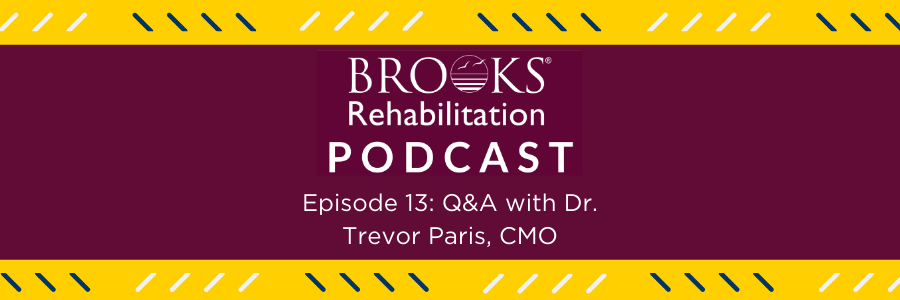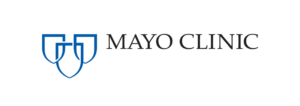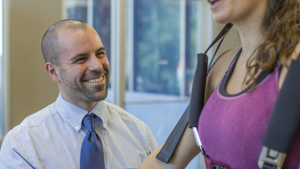Podcast | Episode 13: Q&A with Dr. Trevor Paris, CMO

Back to physical health resource hub
Welcome to the Brooks Rehabilitation podcast where we talk to our rehabilitation professionals to shed light on the stellar programs and services we offer to help our patients reach their highest levels of recovery.
We were joined by our System Chief Medical Officer, Dr. Trevor Paris, FAAPMR, to discuss his perspective on rehabilitation and how our system uniquely offers therapy services unlike any other in the country.
Send us an email with your questions, comments or podcast ideas to [email protected]!
Listen to the full episode on your favorite podcast app! Search ‘Brooks Rehabilitation Podcast.’ You can also listen online. Below is a transcript of our newest episode.
Podcast Transcript
Tracy Davis: So Dr. Paris, thanks for joining me. Just, if you’d like to introduce yourself a little bit.
Trevor Paris: I’m Trevor Paris. I came to Brooks in 2006 as the Stroke Program Medical Director. It was the beginning of our physician employed medical group here at Brooks. And this year I’ve been promoted to System Chief Medical Officer.
Tracy Davis: So whenever you talk about a chief medical officer, there’s probably a lot of people out there that don’t really know what that job means. What does it mean to be a chief medical officer?
Trevor Paris: Well, primarily it’s looking at overseeing the clinical care of the system and that relates to both safety and quality measures, and also the delivery of care by our physician group and also consultants. But I am primarily responsible for our employed physician group.
Tracy Davis: So who do you typically partner with at other facilities around the area? Or how far out do you partner with other facilities?
Trevor Paris: Well, of course we partner with everyone that’s our partner in the acute care arena and all acute care hospitals have chief medical officers in their system or actually in their hospital. So I work with all of them. And I also work with, of course, chief nursing officers, COOs, anyone who is in administrative leadership, in developing service delivery between an acute care and rehabilitation setting.
Tracy Davis: So we have the physician practice here at Brooks. How will you work to evolve that? And maybe the clinical practice overall at Brooks?
Trevor Paris: Well, our physician practice started in 2006, and we have just grown four or five times larger than when we first started. And we grow according to the growth of our system. We’re here to serve the system. And so as we have added additional services, such as skilled nursing, expanded to Halifax for another inpatient rehabilitation unit, and as we continue to grow at Bartram when we build our new hospital there, of course we’re adding staff to facilitate the needs of those different facilities.
And then we’re also expanding our outpatient reach in our main clinic here at University. Trying to provide for the needs of our key diagnostic groups of patients in the system: spinal cord, brain injury and stroke. And so we know that in order to serve those needs, we have to expand our Outpatient Clinic and be able to provide for long-term chronic care for the disabled in those neurologic categories. And so the physicians that we’re adding in the next year or two will be helping us to do that.
Tracy Davis: Great. Are you excited about the new Bartram IRF?
Trevor Paris: Yeah, I think it’s going to be a great addition. We clearly are at capacity and over-capacity with patients here at the University campus. And so having that additional bed capacity is going to help us meet the needs of our patients here in the Jacksonville community. And I think we have a great leadership team developing for that campus already.
Tracy Davis: For sure. Yeah. I’m excited to see it because if you look at the renderings, it’s beautiful. It’s going to be a beautiful campus.
Trevor Paris: Yeah, it is. I’m jealous.
Tracy Davis: I know. I know. We obviously know that the quality that we provide to our patients and to our employees and everything like that. So whenever you hear the term “national leader”, what does that mean to you?
Trevor Paris: Well, I think national leader really means a couple of things. One is that for rehabilitation professionals, it’s a place where they look to, or they would look to Brooks for answers to complex rehabilitation problems. They look to us as innovators for rehabilitation technologies or processes that help improve outcomes. They would also look to us as a model for excellence in rehabilitation care. So the importance for us in being able to demonstrate those things is to have excellent outcomes. And so that is why it’s so important for us to be able to provide that kind of data and information to our national partners, to allow them to see us in that setting.
Tracy Davis: So how can Brooks differentiate itself in a competitive environment?
Trevor Paris: Well, there are going to be more and more providers of rehabilitation services in the Jacksonville and regional area. And so, we want to make sure that, again, we’re number one. Number one in patient outcomes; number one in patient experience. Also, being a great partner for our acute care referral sources because they have a lot of pressures and needs on them and we need to make sure we’re meeting those needs. If we meet them better than anyone else, then we’re going to be the preferred provider. But our patients also have to feel that difference, and we have to demonstrate that in both patient experience and outcomes. And providing for all their needs, not just the inpatient needs, but the outpatient needs and long-term care needs for patients that have chronic disabilities.
Tracy Davis: Sure, absolutely. And Brooks, a lot of people, I feel like I’m just anecdotally going around town, I tell them, I work at Brooks. They’re like, “Oh, are you at the one here at San Pablo?” Or they don’t realize that we’re a whole system. That we have multiple locations that do many, many things.
Trevor Paris: Yeah.
Tracy Davis: So what is our system of care? What does it mean to you?
Trevor Paris: Well, our system of care really means that we have a connected chain of care settings and those can be both inpatient, home health, outpatient. We have to be able to communicate with our providers from one place to the other. Patients need to feel that we understand them across our system, no matter where they enter. So if they’ve been in a couple of different care settings, they need to feel like we understand what they’ve been doing in the previous care setting, and that we’re ready to get started from the beginning of that experience and not have to go back and rewrite the story because we didn’t know what happened to them.
Also, they need to feel that we’re building from one transition point to another, so that they’re going to have the best outcome of the shortest period of time. We’re not wasting their valuable time. And in some cases there are significant time constraints on their lengths of stay. And if we waste two or three days figuring out where to start, then we wasted their time. So we need to be mindful of that as well.
Tracy Davis: Absolutely. Where do you see the system of care going and maybe evolving in the future?
Trevor Paris: Well, we have a couple of big strategies for this next few years. And one of those is to really have a better system of linking our system together. What we might call a digital platform, a virtual platform, that helps us to really communicate better from care setting to care setting. A better system of outcome measures across our system. So we can see that if a patient enters the hospital with a stroke, when they finish their outpatient experience, we can look at the outcomes from the hospital to the outpatient experience and really determine we’ve done a good job. Or if we haven’t, what do we need to do to fix the program?
And also that we have a better way of allowing patients to enter our system virtually and get the information they need. And to be able to get data or communicate their progress in Brooks to their own personal primary care providers. So a lot of things need to be done to improve our ability to work within the system to provide that kind of service to our patients and referral sources.
Tracy Davis: Absolutely. And if you were, let’s say that I’m a patient or a family member that’s entering Brooks for the first time, why should the system of care matter to me?
Trevor Paris: Because if we’re communicating like we should, if we’re delivering the programmatic consistent model of care across our system, they’re going to get better outcomes and are going to get it more efficiently. And, and I think patients, the outcome means they’re going to hopefully go home at the highest level of function. And so that’s critically important for a family member to get what they need to get them to their highest level of function. And also to know that Brooks cares for them across their whole experience with a disability. As we all know, stroke doesn’t just last for three weeks or three months. It could last for a lifetime. And so for Brooks to be able to provide for services and need of these folks for the extent of their disability is very important to them.
Tracy Davis: Can you tell us about the new Center for Care Transitions and what its purpose is?
Trevor Paris: Yeah, that’s an exciting new development that we started working on this year. Monica Alexanderson and one of our physician’s assistants has been with us for four or five years now, working in the inpatient hospital, had a desire to advance into management and so she has been working with me and Amanda Osborne to create this new center. What that really is going to be as a multidisciplinary group of clinicians, physician assistant, a nurse practitioner, LPNs, case manager, and guides who will be helping to transition our patients from any Inpatient setting into the home setting.
So they’ll be monitoring and following our patients for a 60-day period of time after they leave an inpatient setting to the home. And the purpose of it really is to assure that the work that’s been done in the Inpatient is being carried out in the Outpatient home environment. Making sure the patient medications are straight and correct, that they’ve linked back to their primary care providers in the community, that the therapies that were ordered have indeed started in doing the job they’re supposed to do, that the DME that was ordered is also in place and working. And also that the caregivers themselves feel competent to do the job they’ve been asked to do. That they feel safe, they feel prepared.
And then if their needs that happen and develop, we can get those needs managed quickly. It’s been very difficult in the past for some of our care providers out of the hospital to get communications from the referral sources in the hospital. So with this hopefully will help to smooth that out and also improve access to decisions that need to be made quickly.
Tracy Davis: And last question. What excites you about the future rehabilitation and what we’re doing at Brooks?
Trevor Paris: Well, I think there are a lot of exciting things happening in rehabilitation. A lot of it relates to technology. We have the how, which is our sort of newest technology advance, the robotic system that we use in the spinal cord and now starting to use in stroke, which will help to advance walking for patients that have those disabilities. But I think technology, in general, ability to advance neurologic rehabilitation, neurologic progress in a way that we haven’t been able to before, and also will help just add to the clinicians’ tools to work with to help facilitate recovery.
So I think that that is an exciting component of rehabilitation progress. But also the Telehealth opportunity that we’ve learned from the pandemic. Before because of all the regulatory restraints on Telehealth, we didn’t have that availability. But now that the pandemic has allowed us to use Telehealth more broadly, it’s just been a tremendous asset to our patients, especially those with disabilities who might live far away from Brooks main campus. We now can reach them in a way that we couldn’t before. So we can check on them more frequently. We can check on those that are distant, and it also makes a visit possible for those who have significant disabilities in transportation and all of those issues are so complicated. So I think it’s going to help us to maintain people in their home better and safer and hopefully achieve better outcomes.
Tracy Davis: Great. Well, thank you for taking the time to come on the Brooks Podcast.
Trevor Paris: Yeah, it’s been great to talk with you.
Tracy Davis: Appreciate it.
To listen to more full episodes from the Brooks Rehabilitation Podcast, search for ‘Brooks Rehabilitation Podcast’ on your favorite podcast app!


